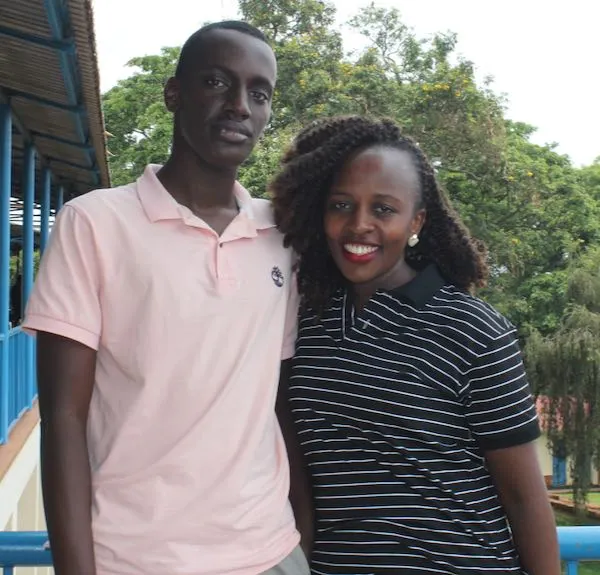By Patty Huston-Holm with Laura Cenge and Nicole Nankya
One dictionary definition of “mentor” is “experienced and trusted advisor.”
Pamela Tumwebaze, head of the Uganda Christian University (UCU) Honors College, can recall having many, including the Rev. Prof. John Kitayimbwa, Deputy Vice Chancellor for Academic Affairs (DVCAA). It was him, in fact, who propelled her to her current job title and got her thinking about making mentorships a deeper part of the Honor’s program.
Tumwebaze remembered an early 2021, end-of-day conversation in her role as the DVCAA Executive Assistant. The university had been in Covid-related, government-ordered lockdown for nearly a year. The university’s financial status, exacerbated by no students and no tuition, required leadership decisions about cuts. The head of the Honors program was leaving to work on his PhD, making that program a prime candidate for the chopping block.
“He (Kitayimbwa) told me the Honors program was going to be shut down,” recalled Tumwebaze, who, like most workers on the Mukono campus at the time, was near exhaustion from doing multiple jobs – theirs and for those not around due to travel restrictions and inability to be paid.
She recalled: “I said ‘I’ll do it.’ He said I couldn’t. But the next morning he said he thought about it, and that I could. He believed in me.”
Such encouragement is part of what a good mentor does. Good mentees do all they can to substantiate that faith.
The UCU Honours College is a leadership development initiative started in 2002, with a focus on Christian principles, as well as creativity and critical thinking. Undergraduate students from all programs are eligible to apply if they have a 4.0 of 5.0 grade point average or higher. In addition to reinforcing the value of academic knowledge, the UCU Honors College program addresses the value of “soft skills”, such as public speaking, work ethic, team building and engaging in relationships, including those with mentors.
Written assignments, oral presentations and service projects with informal mentorships have long been a part of the College. Formal mentorships are new.
Fresh on the job as the Honors College head in January 2021, Tumwebaze realized mentorship was going to be a key component of the program, but implementation with no in-person learning required a virtual strategy. By mid-year, she had a plan that she launched with two students each for four mentors – two Americans (one being Peggy Noll, the wife of UCU’s first Vice Chancellor) and two Ugandans (Johnson Mayamba and Dennis Wandera) living in the United States.
The plan included expectations that mentors be academic and/or career professionals approved by Pamela and willing to be encouragers and coaches. Mentees are expected to be timely and provide learning needs.
Virtual mentorships had expected challenges of student Internet access and understanding that mentors were in different time zones. With students back in session, the number of mentorships has grown to 30 in-person and virtual faculty, alum and other professionals for 96 Honors College students. All program areas are represented with the largest single number from Law.
“I’ve always been a bit of a dreamer, willing to try new things,” said Tumwebaze, who has UCU degrees related to literature and is working on a third, a master’s in strategic communication. “Covid taught me to re-create myself.”
A mother of two, Tumwebaze shared that to help support her family during the pandemic, she bought used clothing in Kampala, kept it in her car and sold it to friends. At the same time, she put energies into teaching a literature class and leading the Honors College, encouraging students at a time when she knew many felt hopeless and even suicidal.
“In spite of what I knew was going on in their lives, I encouraged them to look around and serve others,” she said. “We are all broken. I tell them to trust God to open their eyes and help someone else while also helping themselves.”
Those service projects have included cleaning up trash, educating new mothers in a rural village and reinforcing reading for children.
“When Christ calls us, we shall need to show how we helped someone,” she said. “Look for your gifts and use them in His name.”
In mid-March, one such gift is tacked on the bulletin board of Tumwebaze’s second floor office in a building known as “M Block” next to Nkoyoyo Hall. The childlike drawing of a rainbow was made by her almost-four-year-old son for his appreciation of her visit to his school.
Another gift this day was Honors College student, Steven Nsenga, seated by the door. He is a soon-to-be graduate with a Bachelors in Human Rights, Peace and Humanitarian Intervention in the Faculty of Social Science. He is concerned about refugees.
And he is, Tumwebaze pointed out, assigned to a mentor who gave her this job – the Rev. Dr. John Kitayimbwa.
TOMORROW: UCU Standard intern Nicole Nankya tells more of the story of student and mentee, Steven Nsenga.


